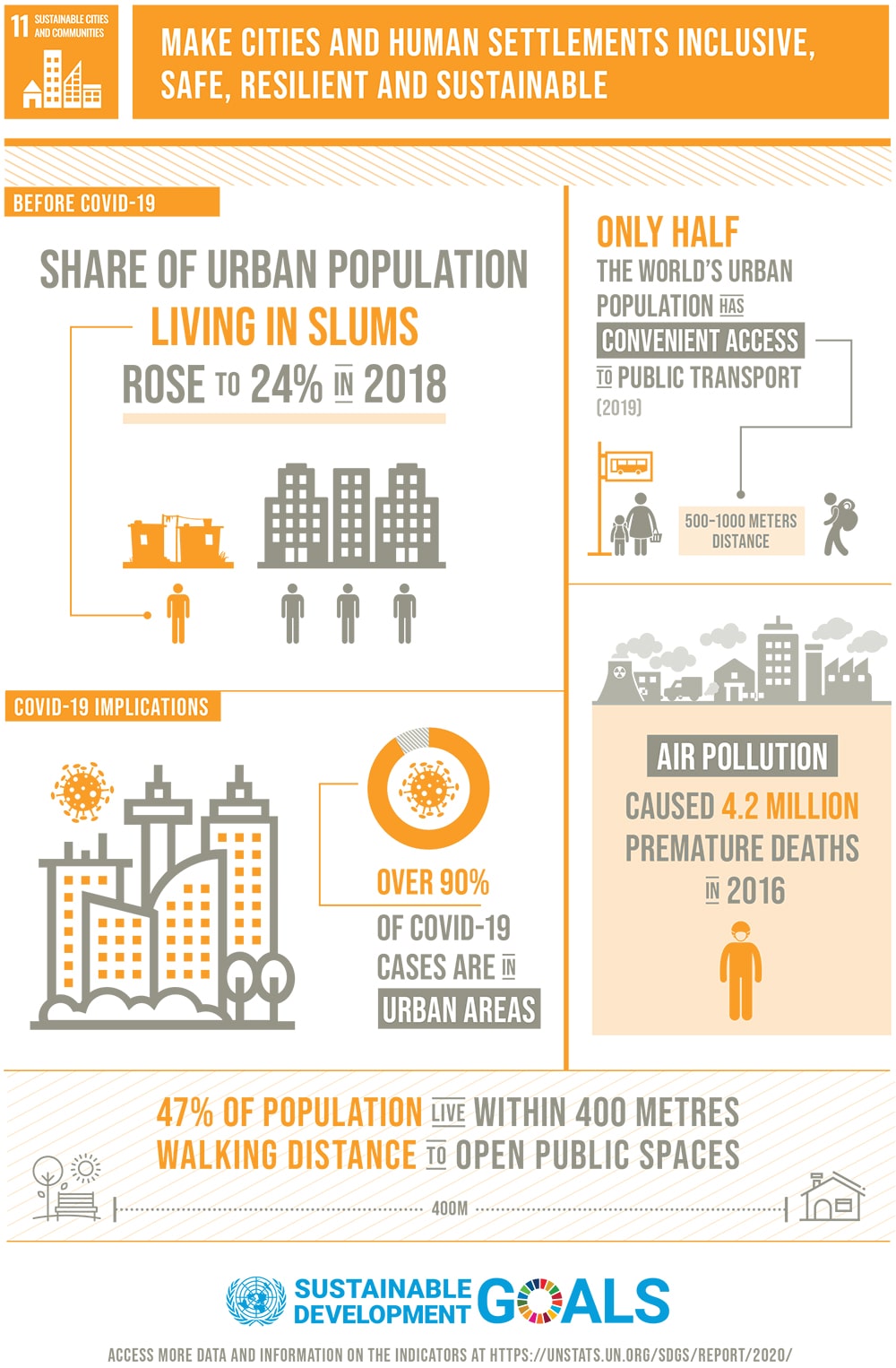Why are sustainable cities important
As economies develop and improve, cities are seen as a sign of growth and development. Urban spaces have been structured as centers of economic activity, primary healthcare and quality education with ease of access to various amenities. However, most urban spaces in developing countries especially harbor a portion of the population belonging to the urban poor. This urban poor refers to the people under the poverty line who dwell in the cities. It generally includes daily wage laborers and rural migrants who come in search of work.
With the movement due to attractive economic opportunities, cities have observed a growing population. Despite this being parallel to increasing urban slums, rapid urbanization has been seen as a must to represent a country’s development. However, according to the Sustainable Development Goals Report-2020, this rapid urbanization has seen an increase in air pollution, inadequate and inefficient infrastructure along with worsening urban sprawl.
This necessitates the structure and development of cities in a manner which is resilient, sustainable and accessible. Developing infrastructure that is energy efficient and eco friendly helps create a green city. A smart city is an urban area that limits its carbon footprint, is resilient, has high standards of living and greater availability and affordability of basic human resources.
According to UNDP, a sustainable city carries the characteristics of both a green and a smart city. To bring the same into existence, investment is required in building green public spaces and developing public transportation, and accessible and affordable amenities and opportunities through improved urban planning and management.

Understanding the root cause for sustainable cities
Cities house a great number of populations in search for employment and investment, thus becoming a center of economic activity. This is due to the increased opportunities and better facilities relatively offered in rural and remote areas.
Therefore, with the rapid urbanization and urban sprawl in mind, there is a need for sustainably managed cities. Sustainable in terms of energy efficiency, improved infrastructure, reliable services and resilient economy.
This is especially important to ensure that the growing urban poor dwelling in slums move out of poverty and use opportunities provided in cities to become resilient. Resilience in the form of job security, health security and food security. The coronavirus pandemic has emphasized on the importance to build this resilience through developing the cities sustainably.
UN Habitat has expressed concerns regarding the vulnerability within the slums in the face of the pandemic. Slums across Africa, Asia and Latin America are greatly vulnerable to the spread of virus. Whether it is the slum in Nairobi or in Mumbai, the poor suffer not only due to their proneness to infection due to malnutrition, HIV/AIDS, but also their exposure to waste water, open water bodies etc.
Food and Agriculture Organization (FAO) also emphasized on a city’s inability to cater to the poor due to lack of infrastructure to contain the pandemic. The organization stressed that there is a possibility of starvation amongst the poor due to lack of accessibility and affordability to food. It has urged the people to take action to ensure a flow of food for the poor.
Changemakers fighting poverty
With cities being hubs of economic growth and social development, various stakeholders have taken action to ensure these hubs which attract economic activity, are fair and sustainable for its inhabitants. UN Habitat is a UN entity which is focused on providing a better future in the urbanizing world. Institute for Sustainable Communities is an organization that works on a global scale by driving transformative community based initiatives and solutions sourced from the local communities to build spaces for environmental and economic development. ICLEI is an organization that brings together more than 2500 local governments to work toward sustainability by ensuring local communities are resilient, sustainable, equitable and eco friendly. C40 is an alliance of over 40 megacities around the globe to collaborate on climate action, through building action plans for climate resilient infrastructure, mitigation initiatives etc. Cities Alliance is a global scale initiative and partnership to ensure the urban poor is uplifted socio-economically, to ensure there are no cities with slums.
What youth can do as a TAL transformer
Cities are primary centers of education and action in the current world. Therefore, as areas of growth and development, cities have to be inclusive, resilient, sustainable and efficient.
What you as a transformer for the society can do, is use social advocacy, philanthropy and entrepreneurial/business ideas in an innovative manner to provide a progressive direction for reaching the goal. Instances of which are as follows:
Social Advocacy
- Develop a vision for sustainably constructed models within immediate vicinity
- Educate regarding eco friendly construction
- Advocate for better living conditions
Social Philanthropy
- Invest in public transport network
- Investment in urban planning
- Aid the poor during economic losses incurred due to shocks
Social Entrepreneurship
- Create career and business opportunities
- Management of urban planning to create safe and inclusive environment
- Reduce per capita impacts of cities on the environment
References
United Nations (2020). The Sustainable Development Goals Report 2020. New York: United Nations, Department of Economic and Social Affairs. Retrieved from https://unstats.un.org/sdgs/report/2020/
https://www.undp.org/sustainable-development-goals#sustainable-cities-and-communities
https://news.un.org/en/story/2020/05/1063622
Sustainability Program Manager
